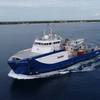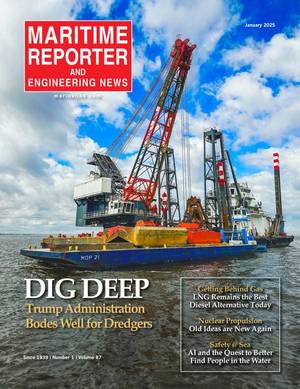Singapore Hosts International Labor Organization
Today, the International Labor Organization’s (ILO) Maritime Labor Convention, 2006, (MLC, 2006) will enter into force in the first 30 States to ratify the Convention, with other ILO Member States scheduled to bring it into force over the next 12 months.
The MLC, 2006 is an important international regulatory instrument that will provide protection at work for more than 1.5 million seafarers who serve on the world’s fleets.
Widely acclaimed as the "fourth pillar" of the international regulatory regime for quality shipping, and complementing the three key Conventions of the International Maritime Organization (IMO), the MLC, 2006 sets out seafarers’ rights to decent conditions of work on a wide range of subjects, and replaces almost 70 existing conventions and regulations, which would also benefit shipowners with a clear, consistent set of standards with which all must comply.
Adopted by the ILO in 2006, the MLC, 2006 is the result of years of hard work and cooperation on the part of the official ILO ‘social partners’ - national shipowners’ associations coordinated by the International Shipping Federation (ISF) and seafarers’ trade unions coordinated by the International Transport Workers’ Federation (ITF).
A panel comprising high-level representatives of seafarers, shipowners, Singapore’s maritime administration and the ILO came together today to commemorate the entry into force of this historic Convention. Held against the backdrop of Singapore’s bustling container terminal, one of the world’s busiest ports, the hour-long panel discussion was broadcast live over the internet at 0700hr GMT from the bridge of APL Yangshan, a Singapore-flagged ship owned and managed by Singapore’s national carrier Neptune Orient Lines.
On the discussion panel were Dr. Cleopatra Doumbia-Henry, Director, ILO Department, International Labour Organization; Capt. Robin Foo, President, Singapore Maritime Officers’ Union (SMOU); Mr. Daniel J. S. Tan, Executive Director, Singapore Shipping Association (SSA) and Mr. Mark Lim, Deputy Director (Shipping), Maritime and Port Authority of Singapore (MPA) and Chairman, Tripartite Working Group on MLC.
The panel discussed the impact of MLC, 2006 on world shipping and took live questions received via ILO’s Facebook page and Twitter hashtag #MLC2006.
Dr. Cleopatra Doumbia-Henry, who was responsible for the development of the MLC 2006 and remains responsible in respect of it, said, “August 20th 2013 is a day to celebrate. It marks the entry into force of the Maritime Labor Convention, 2006, the ILO landmark Convention that seeks to ensure that the social pillar of the maritime industry is on an equal footing with the safety and environmental pillars, thereby ensuring sustainable and quality shipping. The MLC, 2006 was five years in the making and seven years of concerted effort by the ILO, governments, shipowners’ and seafarers’ Organizations, as well as the broader industry and the European Union to get us to this day. With its twin objective of a seafarers’ bill of rights and fair competition for shipowners, it is a win-win for all of the industry. We all now need to continue to work together to make it a success through effective implementation. I want to especially thank the government, the shipowners and seafarers’ organizations of Singapore for the exemplary way in which they have – through tripartite social dialogue – worked to give effect to the Convention’s provisions.”
Ms. Mary Liew, a Nominated Member of Parliament and Executive Secretary of the Singapore Maritime Officers’ Union representing seafaring officers said, “We welcome the implementation of the MLC, 2006 as it imposes a minimum standard of decent work for seafarers all over the world, addressing the issues of employment conditions, work and rest hours, accommodation, food, health protection, medical care, repatriation, welfare and social security protection. The maritime tripartite partners here in Singapore have worked in concerted effort towards ensuring that our maritime industry is ready for the MLC coming into force. Whilst the MLC, 2006 provides a minimum standard for seafarers, as unions, we will continue to work with shipping employers to offer employment and wage conditions that are above and beyond what the Convention offers, for our seafarers and members sailing across the world’s oceans.
Supporting Dr. Doumbia-Henry’s earlier comment, Ms. Liew proclaimed, “This is a day of rejoicing because this Convention will not only protect our seafarers but it will improve the relationship and communication between the various stakeholders. The whole maritime industry will certainly benefit from this comprehensive convention that has taken many years to implement. This historic moment will be remembered and appreciated by many.”
Representing the shipowning community in Singapore, Mr. Daniel J. S. Tan, Executive Director of the Singapore Shipping Association commented, “As responsible shipowners, we are strongly committed to safeguarding the fundamental rights of our seafarers. In this regard, we, along with our tripartite partners have been actively involved in the MLC, 2006 since it was first conceived in 2001. In addition to working closely with our tripartite partners, we have also been doing our utmost to ensure personnel at every level are fully familiar with the requirements of this Convention.
He continued, “Today, I am pleased to announce that our seafarers are well-taken care of and our Singapore ships are certified and fully compliant. We cannot afford to be complacent, however – the very flexibility and scope of the Convention, as well as the global nature of the shipping industry means that our shipowners are going to be exposed to States that may have different interpretations of the MLC, 2006, possibly at a very fundamental level.
Given that there are 185 ILO Member States, complications may well arise as the Convention enters into force across the globe. Nonetheless, I am confident that as we continue working with our tripartite partners, we will be able to address any unexpected hiccups if they arise.
Mr. Kam Soon Huat, General Secretary of the Singapore Organization of Seamen (SOS), whose Union represents ratings onboard ships, also showed his support. He commented, “The MLC 2006 ushers in a new era of comprehensive and enlightened work environment for seamen. With the MLC 2006, seafarers will be better informed of and protected by their fundamental rights – the rights to a safe and secure workplace, where the safety standards are complied with, where you have fair terms of employment, decent livings and working conditions.”
Capt. Francis Joseph, Chairman of the Singapore Maritime Employers’ Federation added, “SMEF and our general membership is proud to have been part of the works within the Singapore maritime community to address the different areas of concerns for the continued welfare and protection of the seafarers as embodied within the provisions of the MLC 2006. After years of consultation and constructive dialogue with our tripartite partners we are pleased to have been part of the process and to witness this historic milestone. I am confident that today, with the maritime communities of nations united behind the implementation of MLC 2006, our seafarers’ welfare can only get better. This applies not only for the seafarers from Singapore but the world over, whose seafarers continue to provide their expertise and competence in manning the world’s fleet that keeps shipping safe, secure and much more efficient.”
Mr. Tan Suan Jow, Director (Shipping) of the Maritime and Port Authority of Singapore (MPA) said, “As a responsible maritime administration, Singapore recognizes the essential role that seafarers play in our maritime community. We are glad that seafarers’ welfare and interests will be protected under the MLC. MPA will continue to work closely with our tripartite partners to facilitate the smooth implementation of the MLC and the continued protection of seafarers who provide a service that is essential to world trade and the global economy.














